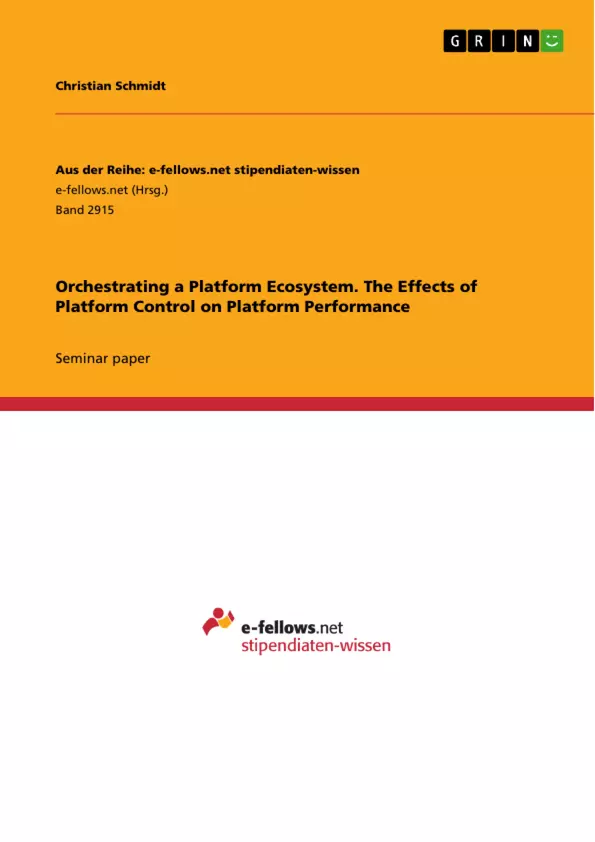This paper examines the effects of control mechanisms on a platform. First, the theoretical background of important terms in this field is given to gain a common understanding, which is necessary for classification as well as results. In this thesis, platforms are defined as products and services, which bring together user groups and enable transactions between the groups by providing infrastructure to do so. Second, literature dealing with this field of study is processed to provide a comprehensive and transparent overview about current research, including the platform type, dependent variables, and findings.
Input, output, process, clan, self-control, as well as open and closed platforms, rules & values and boundary resources are identified as the most relevant control mechanisms. Thereby the first research question what types of control mechanisms are discussed in literature, is answered. The findings then are analyzed for these different types of control to address the remaining research questions how control mechanisms effect platforms and when this is useful. It can be pointed out that most mechanisms go along with advantages and disadvantages, as theory suggests. Thus, decision makers have to be clear about the goal they want to achieve when changing platform governance or control to use these effects for their advantage. If a platform aims at optimizing e.g. the degree of openness, this depends on the question: what is optimal for the platform?
As ecosystems typically face the trade-off between quality (e.g. apps) and quantity (e.g. number of users), platform owners have to strategically position the platform somewhere along this continuum. The finding that some control mechanisms are superior to others for achieving certain goals, however, can directly be beneficial to managers. Also, the methods applied by the studies are analyzed, coming to the conclusion that case studies represent the predominant method in this field. Lastly, the results are discussed, contributions and limitations of this work are considered. Also, shortcomings and research gaps in this field are highlighted and future research areas are exemplified. Especially the conduction of an event study and adopting a more strategic approach are intriguing for a master thesis to fully cover the implications of managers’ decision regarding platform ecosystems.
Inhaltsverzeichnis (Table of Contents)
- Introduction
- Theoretical Foundation
- Platform and platform ecosystems
- Network effects
- Control and governance mechanisms
- Governance challenges
- Methodology
- Results
- Literature classification
- Summary of research findings
- Effects of input control
- Effects of output control and process control
- Effects of clan control and self-control
- Effects of opening a platform
- Effects of boundary resources
- Analysis of methods used in literature
- Discussion
- Conclusion
Zielsetzung und Themenschwerpunkte (Objectives and Key Themes)
This seminar thesis examines the effects of platform control on platform performance within the context of platform ecosystems. The research aims to understand the various control mechanisms employed by platforms and their impact on the overall success and development of the platform ecosystem.
- Platform control mechanisms
- Network effects within platform ecosystems
- The governance challenges of platform ecosystems
- The impact of platform control on performance
- The role of boundary resources in platform ecosystems
Zusammenfassung der Kapitel (Chapter Summaries)
- Introduction: This chapter introduces the topic of platform ecosystems and highlights the significance of platform control in determining their performance. It establishes the context for the research and outlines the key research questions.
- Theoretical Foundation: This chapter lays out the theoretical framework for the study, defining core concepts like platform ecosystems, network effects, and control mechanisms. It explores the different types of control that can be exercised within platform ecosystems, such as input, output, process, clan, and self-control.
- Methodology: This chapter details the research methodology employed in the study, outlining the approach used to review and analyze existing literature on platform control and its effects.
- Results: This chapter presents the findings of the literature review, classifying the reviewed studies based on their focus on different control mechanisms. It summarizes the research findings about the effects of various control mechanisms on platform performance, exploring topics like input control, output control, clan control, opening a platform, and boundary resources.
- Discussion: This chapter critically analyzes the findings from the literature review, exploring potential limitations and implications of the research. It discusses the different perspectives on platform control and its relationship with platform performance.
Schlüsselwörter (Keywords)
This thesis focuses on platform ecosystems, platform control, network effects, governance, control mechanisms, platform performance, boundary resources, and the impact of different types of control on the success of platform ecosystems.
Frequently Asked Questions
What are the main control mechanisms in platform ecosystems?
The identified mechanisms include input, output, and process control, as well as clan control, self-control, boundary resources, and the degree of openness.
What is the trade-off between quality and quantity on platforms?
Platform owners must balance the number of users (quantity) with the quality of third-party contributions (e.g., apps), as loose controls may increase quantity but decrease quality.
How do boundary resources affect platform performance?
Boundary resources, such as APIs or SDKs, enable external developers to create value for the platform, acting as a crucial tool for orchestrating the ecosystem's growth.
What is the difference between open and closed platforms?
Open platforms allow easier access for third-party developers to foster innovation, while closed platforms exercise stricter control to ensure security and user experience.
What research method is predominant in platform control studies?
The analysis concludes that case studies represent the predominant research method in this field of study.
- Quote paper
- Christian Schmidt (Author), 2018, Orchestrating a Platform Ecosystem. The Effects of Platform Control on Platform Performance, Munich, GRIN Verlag, https://www.grin.com/document/450033



